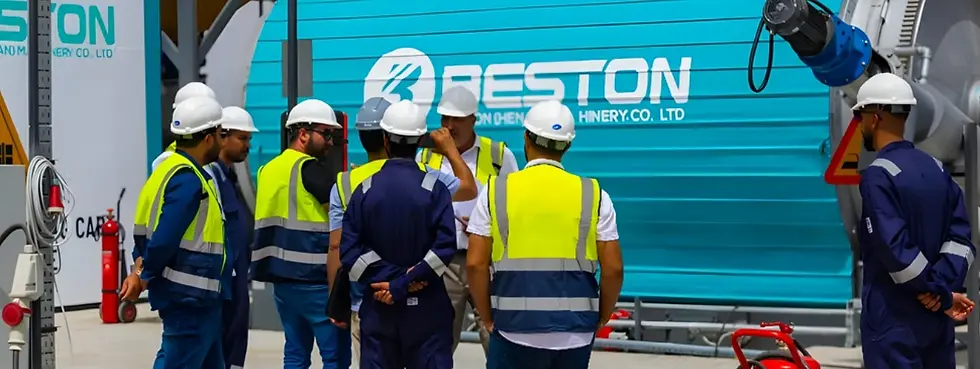Economic Benefits of Using a Thermal Desorption Unit
- Nov 13, 2024
- 3 min read
The adoption of a thermal desorption unit in industrial applications offers considerable economic advantages. This technology, primarily employed for the treatment of contaminated soils, sludges, and other waste materials, facilitates the extraction of hazardous substances, such as oils, volatile organic compounds (VOCs), and heavy metals, through a process of heat-based separation. By providing an efficient means of remediation, a thermal desorption unit not only addresses environmental concerns but also delivers significant cost-saving opportunities for businesses involved in waste management, environmental remediation, and resource recovery.
Cost-Effective Waste Treatment
The primary economic benefit of a thermal desorption unit lies in its ability to efficiently treat contaminated materials without the need for extensive on-site disposal or chemical treatments. By separating contaminants from waste using heat, the unit significantly reduces the volume of hazardous waste that must be transported to specialized disposal sites. This reduction in waste volume translates directly into lower disposal costs, which can represent a significant portion of overall waste management expenses.
In addition, the high thermal efficiency of modern thermal desorption units reduces operational energy consumption, further minimizing treatment costs. With improved heat recovery systems, these units are able to recapture and reuse heat energy within the system, resulting in lower fuel costs and reduced emissions. Over time, these energy savings contribute to a substantial reduction in the total cost of operation.

Increased Resource Recovery Potential
A thermal desorption unit not only cleans waste materials but also recovers valuable resources that can be repurposed or sold. During the desorption process, oils, solvents, and other hydrocarbons are vaporized and separated from the waste stream, allowing them to be condensed and collected as reusable products. This capability significantly enhances the economic viability of thermal desorption by creating new revenue streams from recovered materials.
For instance, the extracted oil or solvent can be purified and reused in manufacturing or industrial applications. In some cases, recovered materials can even be sold to third-party buyers, generating additional income. This process reduces the need for new raw material extraction, helping companies meet sustainability goals while improving profitability.
Lower Environmental Remediation Costs
Environmental remediation is often a costly and time-consuming process, particularly when dealing with hazardous waste or contaminated soils. Traditional methods, such as landfilling or incineration, may offer short-term solutions but fail to address the long-term environmental impact and associated costs. In contrast, a thermal desorption unit allows for a more sustainable approach by removing contaminants and leaving behind a cleaner, safer product for reuse or disposal.
This remediation process reduces the risk of environmental penalties, fines, and compliance costs. By investing in a thermal desorption unit, companies can avoid costly litigation or cleanup operations in the event of environmental violations. Moreover, by adhering to strict environmental regulations, businesses can improve their reputation and avoid the long-term financial liabilities associated with poor environmental stewardship.
Scalability and Versatility
Thermal desorption units offer flexibility in terms of scalability and application across a range of industries, including oil and gas, manufacturing, and mining. Whether processing small batches of contaminated soil or large quantities of hazardous waste, the system can be adjusted to meet the needs of various projects. This adaptability ensures that businesses can scale their operations efficiently as demand for remediation services increases.
Moreover, thermal desorption technology can be employed in both mobile and fixed installations, making it suitable for a variety of job sites. Mobile units, in particular, offer significant cost savings by eliminating the need to transport waste materials to centralized treatment facilities. By treating waste on-site, companies can further reduce transportation and logistics expenses.
Long-Term Savings and Return on Investment (ROI)
The long-term economic benefits of thermal desorption technology are substantial. While the initial investment in a thermal desorption unit may appear high, the system’s longevity and efficiency ensure that businesses recover their investment over time. With reduced operational costs, enhanced resource recovery, and lower waste disposal fees, companies often see a quick return on investment (ROI).
Additionally, because thermal desorption is a highly automated process, it reduces labor costs by minimizing the need for manual intervention and supervision. This automation enhances productivity and allows for a more streamlined, cost-effective operation, which is particularly advantageous in large-scale waste management projects.
Conclusion
The economic benefits of a thermal desorption unit extend well beyond waste treatment. By providing a more efficient, sustainable, and cost-effective solution for contaminated material remediation, businesses can reduce operational costs, recover valuable resources, and enhance environmental compliance. The versatility and scalability of thermal desorption technology also provide long-term financial advantages, making it a valuable investment for companies in various industries looking to improve both profitability and sustainability.




Comments